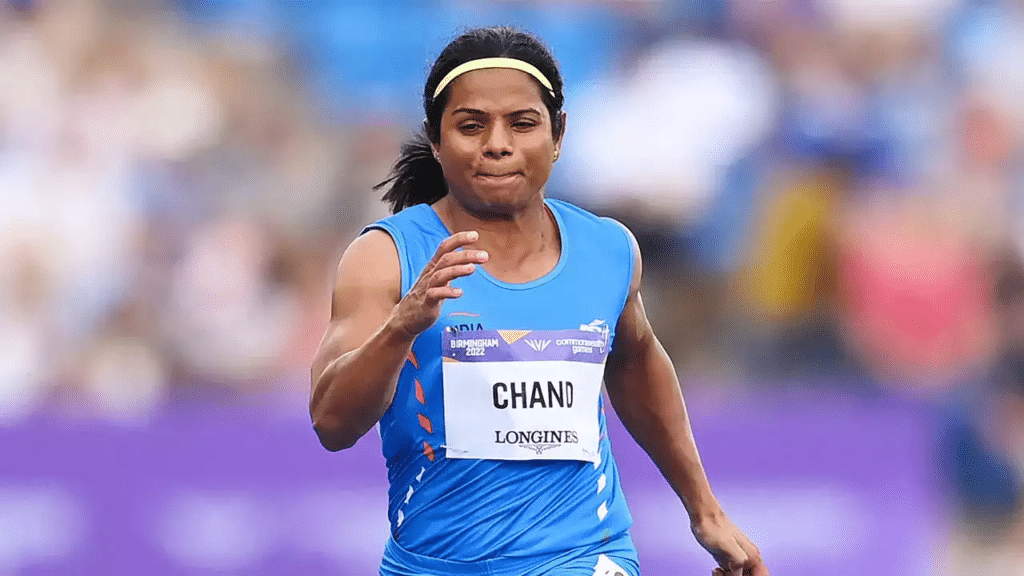Dutee Chand is an Indian Racer and currently she is the national champion in women’s 100m race. She was the third Indian woman to qualify for the women’s 100m at the Summer Olympics. At a world championship she was the first Indian to win a gold medal. In the 2016 Summer Olympics she ran a clock of 11.69 seconds and did not qualify for the second round. Although she did win a silver medal in the 2018 Jakarta Asian Games. In 2019, Dutee became the first Indian woman in the 100m to clock 11.32 seconds.

Early life and challenges
Dutee was born on February 3, 1996 in Jajpur District of Odisha. Her father was Chakradhar Chand and mother Akhuji Chand. They were a family of weavers and were below the poverty line. When she was 10 she got a scholarship at the Sports Hostel and she started her training. Her talent was recognized very early when she won the Duty Nationals tournament by clocking 11.80 seconds in 100m under-18. Initially Dutee was inspired by her sister Saraswati Chand, who has also competed in the field at national level.
In many of Duty’s Interviews it has been seen that she has stated that it was her elder sister Saraswati who encouraged her to choose sports as a career. Saraswati even helped Dutee to get the best training and coaches possible. To provide Duties coaching and training fees Saraswati also took up a job in the police. Later, in 2006 both of the sisters were enrolled in the government sports hostel.
Biggest Hurdle of Duty’s Life
The biggest challenge of Duty’s life was when she was fighting before the Court of Arbitration for Sport. The fight was for the eligibility to participate in women’s sport if her testosterone level is higher than the level given by the medical examiners.
To check the triggers in her body, Dutee underwent routine medical examinations and that was when the news became public. It was a temporary ban so it was unclear whether it would be fair or unfair for Dutee to miss the golden year of her sporting career. Eventually the CASE ruled in the favour of Dutee and in 2015 she was back on the tracks. New guidelines were also brought in by the IAAF on Hyperandrogenism for female athletes.
Dutee also faced a four-year ban on January 3,2023 due to the detection of anabolic agent in her urine sample by the National Anti-Doping Agency. In the interviews given by Chand she has expressed her desire to represent India in the tournaments and is also intended to challenge the decision of NADA and upliftment of the ban.
Her Sporting Journey
In 2012, her career began when she became the national champion in under-18 categories in 100m. At the Asian Athletics Championships in Pune she won a bronze medal.
When Dutee reached the final of the 2013 World Youth Championships, she became the first Indian ever to reach the global athletics of 100m. The same year, she became the National Champion in the 100 metres and 200 metres sprint at the National Senior Athletics Championships at Ranchi. In June 2014, she won two gold medals at the Asian Junior Athletics Championships in the 200 metres and the 4x400m relays.
At the 30th Summer University Games Dutee became the first ever Indian to win a Gold Medal in the 100m. She was in the lead throughout the race by clocking 11.32seconds.
Personal Life
Dutee completed her studies by studying law from KIIT university in 2013. She also worked as a chief executive officer of the state-owned PSU in 2016.
She also became the first openly queer Indian athlete to publicly declare that she was in a same sex relationship. Supreme court’s decision in 2018 to decriminalize gay sex encouraged her to talk about her sexuality but because of this faced a major backlash from her native village. Her sister also threatened to throw her out of the family and other members were also rejecting her by calling it ‘Shameful’.
Author’s Note:
I was deeply inspired to write this article about Dutte Chand, a remarkable individual whose journey is a shining beacon of hope and resilience.Dutte Chad’s remarkable journey as a sprinter , is an inspiring tale of unwavering determination and achievement. I was deeply moved by her resilience, and I hope her story continues to inspire and promote inclusivity in society.









